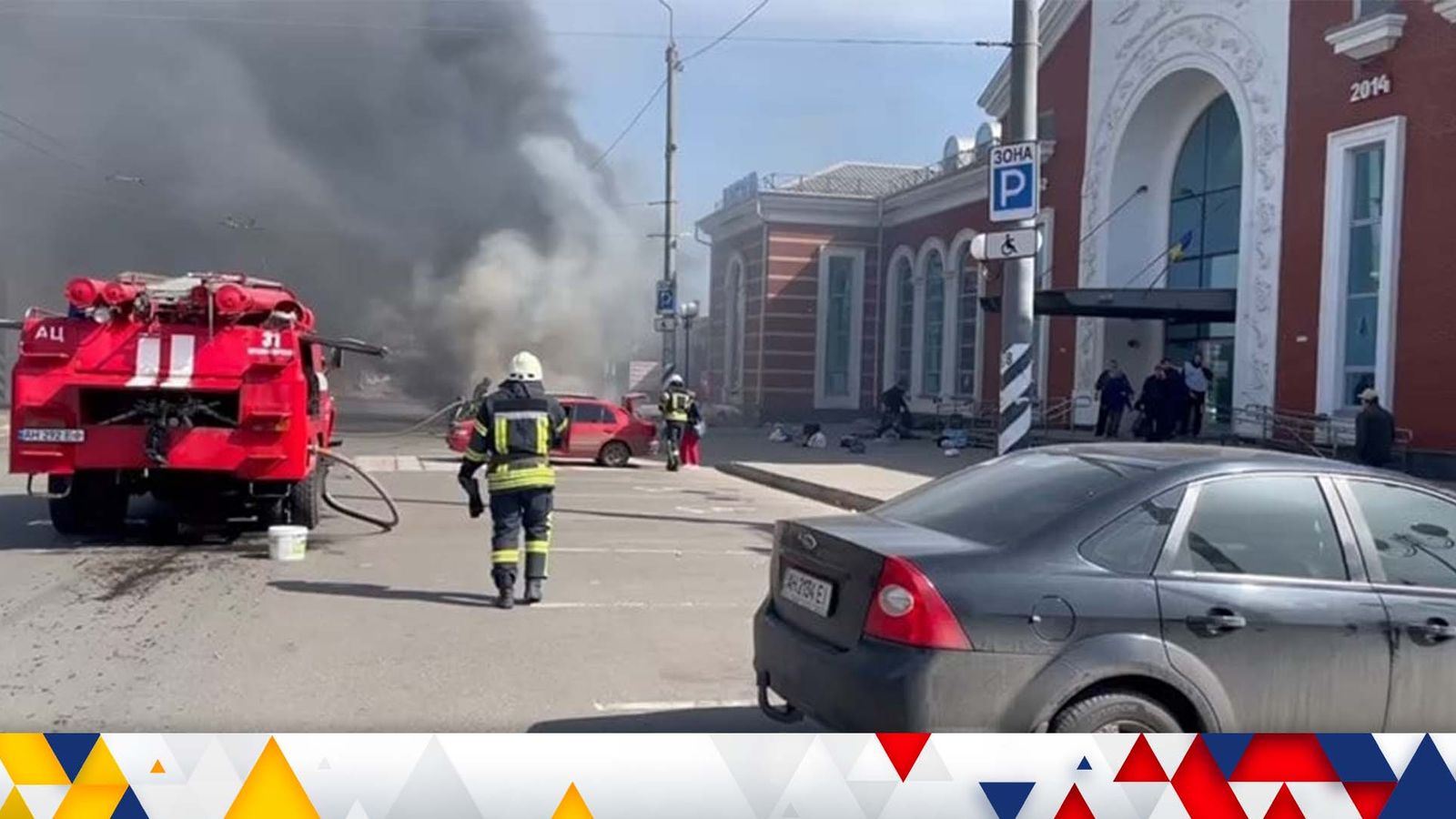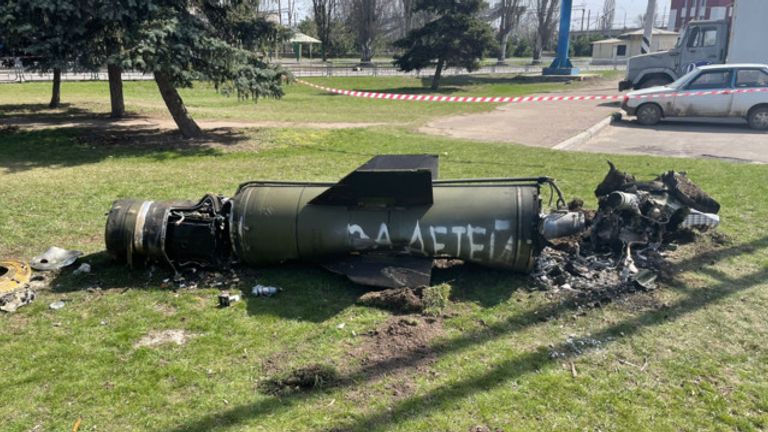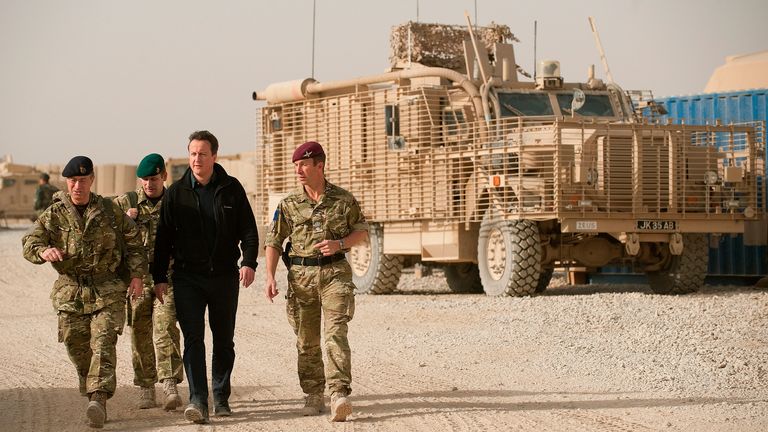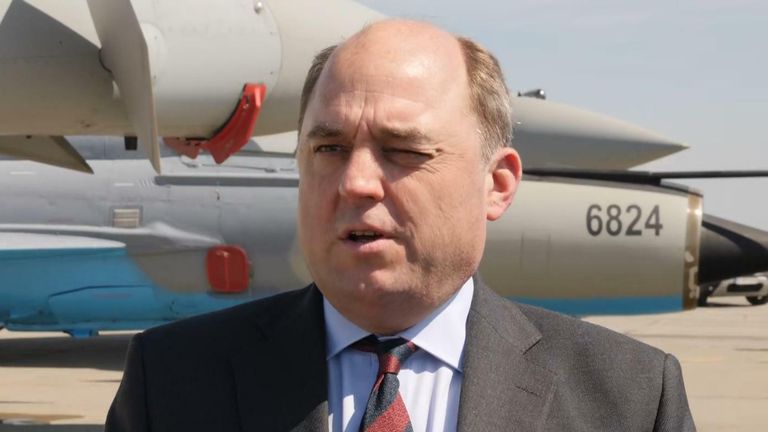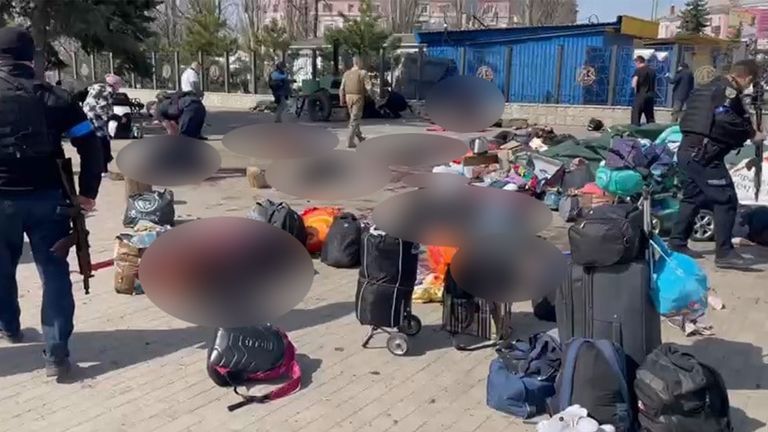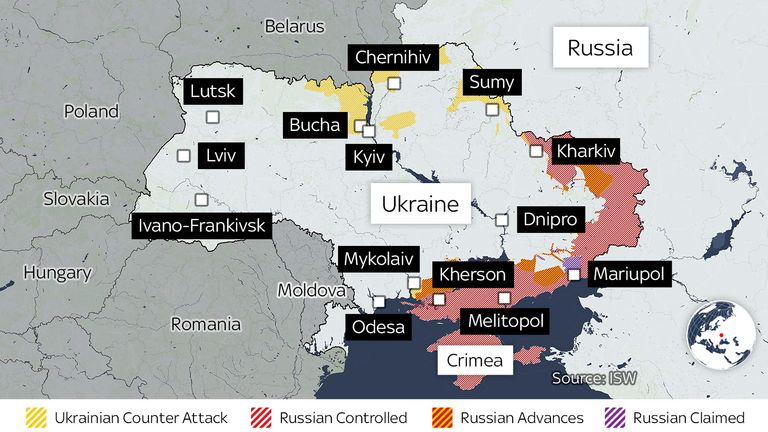Ukraine’s Volodymyr Zelenskyy has demanded a “firm global response” as he blamed Russian forces for a missile strike near a railway station which killed at least 50 people, with the UK set to provide fresh military aid to his country.
The UK will send armoured vehicles to Ukraine for the first time as part of a new £100m package of military aid, as President Zelenskyy warned against “any delay” in offering further weapons and equipment.
Speaking in his nightly video address after what he described as a “war crime” near the station in Kramatorsk, he said a “delay in providing weapons to Ukraine, any refusals, can only mean the politicians in question want to help the Russian leadership more than us”.
Defence Secretary Ben Wallace told Sky News the Ukrainian military will be given Mastiff heavily armoured patrol vehicles, which weigh 23 tonnes and carry eight troops plus two crew.
It is understood they will be stripped of sensitive equipment and could help the Ukrainian army mount offensive operations close to Russian lines.
The Mastiff was designed to withstand Improvised Explosive Devices (IEDs) during the Afghanistan conflict.
Starstreak anti-aircraft missiles, 800 anti-tank missiles, helmets, and night vision goggles will be included in the consignment, in addition to 200,000 items already distributed.
Key developments:
• At least 50 people have been killed by the exploded missile near a railway station in Kramatorsk
• Chernihiv in the north of the country has seen at least 700 civilian deaths, a Ukrainian MP says
• More than 6,600 people were evacuated through humanitarian corridors on Friday
• The European Union has promised to “accelerate” Ukraine’s bid for membership
• Russia has lost 19,000 troops, Ukraine claims, after Kremlin admits ‘significant’ losses
Live updates as Russian forces abandon tanks in ‘possible sign of collapse’
Defence secretary promises support will keep coming
Speaking at a NATO ceremony in Constanta, Romania, Mr Wallace refused to be drawn on whether the UK would commit anti-ship missiles such as the Harpoon, as requested by Mr Zelenskyy.
Mr Zelenskyy says they will help prevent Russia from consolidating its control of Ukraine’s Black Sea coast.
Mr Wallace said: “I won’t discuss different types of weapons systems. I don’t want to flag to Russians any change until they have happened.”
Mr Wallace said: “Our commitment is to support Ukraine to make sure they have as much help as possible to defend themselves. And if the tactics of the Russians change, what we give them will change as well.”
The defence secretary also called the Kremlin “deluded” after Sky News’s interview with Vladimir Putin’s spokesman Dmitry Peskov.
Mr Peskov was accused of living in a “parallel universe” and peddling a “catalogue of lies” when he denied Russians had committed war crimes in Bucha.
Missile kills 50 at train station
The missile strike near the station in Kramatorsk has raised more accusations of war crimes and was described by Ukraine’s president as an act of “evil that has no limits”.
Five children were among the at least 50 people killed. Up to 4,000 people, thought to be largely women and children, were at Kramatorsk station when the blast hit.
Sky’s John Sparks, reporting from the scene, said that emblazoned on the side of the mangled missile was за детей, which translates from Russian as for – or on behalf of – the children.
Subscribe to Ukraine War Diaries on Apple Podcasts, Google Podcasts, Spotify and Spreaker
The station had been packed in recent days as people tried to flee Ukraine, but the Russian defence ministry denied targeting the station.
Speaking to reporters on a conference call, Mr Peskov claimed that the Russian armed forces had no missions scheduled for Kramatorsk.
In his nightly video address to the nation, Mr Zelenskyy said: “Like the massacres in Bucha, like many other Russian war crimes, the missile attack on Kramatorsk should be one of the charges at the tribunal that must be held.”
Read more: Kramatorsk railway station attack survivors and witnesses describe terror on the platforms
Russian forces abandon tanks in ‘hasty’ withdrawal
As Mr Putin withdraws forces from northern Ukraine, one Western official said the signs of abandoned tanks, vehicles, and artillery could indicate a “collapse of the will to fight”.
During a press conference on Wednesday, the official told reporters: “We can confirm that there are no longer units in northern Ukraine.
“It has been a pretty hasty withdrawal by Russian forces and there’s a lot of Russian equipment which has been abandoned in that hasty withdrawal and that’s only going to exacerbate the challenge they have in terms of the refurbishment and reconstitution of their forces as they remove them both into Belarus and into Russia.”
They added: “Some of it is kind of unclear as to why it’s been abandoned because you might have thought some of these vehicles are still usable, and you think they would have been able to take – and I think there’s something around the collapse of morale and the collapse of the will to fight.”
‘Little point’ negotiating with Russia, says PM
Following talks in Downing Street with German Chancellor Olaf Scholz, Boris Johnson said he saw little prospect of success negotiating with Mr Putin directly – although he did not criticise those, such as the French president, who continue to do so.
“Negotiating with Putin does not seem to me to be full of promise. I don’t feel that he can be trusted,” he said.
“That is not to say I don’t admire the efforts of people who try to find a way through. But my own view is that I am deeply, deeply sceptical and, I’m afraid, cynical now about his assurances.”
Meanwhile, Home Secretary Priti Patel apologised after being criticised for delays in accepting refugees as the latest figures show only around 12,000 Ukrainians have arrived in the UK, despite 40,900 visas being granted.
